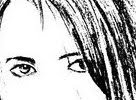As I continue to plow my way through George R. R. Martin’s “A Song of Ice and Fire,” it reminded me of the importance of beauty in fantasy stories. Even in dark fantasy, usually the heroes are handsome, the heroines are beautiful, and the home worlds are beautiful. While I like a mix of beauty/plain/ugly with good and evil traits, many classics have good-looking leading characters, to say the least.
It’s hardly a deep dive into the human mind the reasons why beauty is so represented in fantasy. What’s a world worth fighting for, if not loved for its beauty? Who’s a heroine that needs rescue (I suppose that would be “damsel”) that’s not a beauty? While I liked the original “Beauty and the Beast” story as a kid, what princess would not prefer a hottie guy to marry and live happily ever after in a world of filled with breathtaking scenery?
To me, good-looking characters add to their good intentions, thus placing the finishing touches of a classic “fantasy.” That hardly means that hotties are not effective as evil characters; though a wart hog-appearing hero would be a hard sell defeating a handsome enemy. With female characters it’s similar; in your fantasy do you want the hero to rescue the Wicked Witch of the West? If a homeland is hellhole, does it make sense to fight to the death to save something that wasn’t so great to begin with?
In fantasy, readers want to imagine what’s written in the pages. Beauty remains a trait we all appreciate, so it plays an important role as we create our stories. To see the beauty in fantasy makes us look back to the beauty in our lives.



























